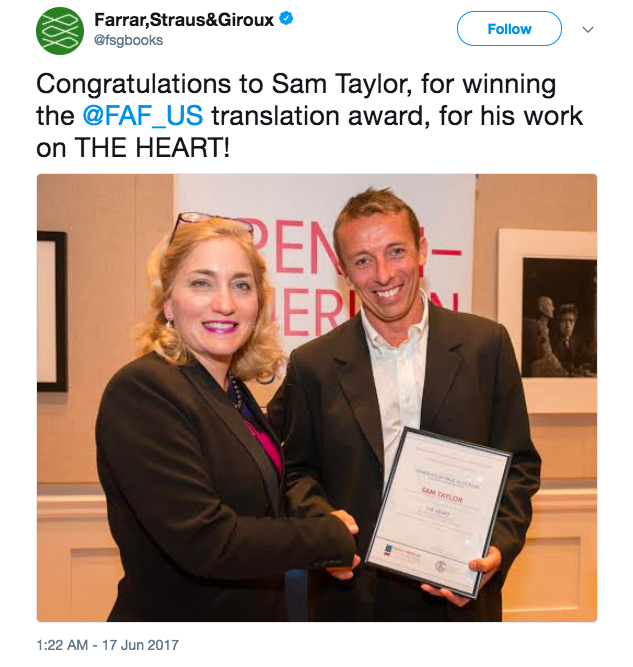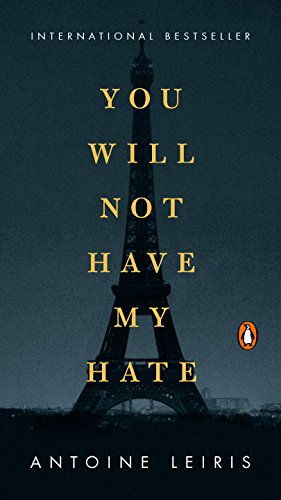French literature in translation – an interview with Sam Taylor: translator of ‘The Perfect Nanny’
 What is literary translation and what’s it all about? Join me as I embark on an eye-opening interview with Sam Taylor, author, and translator of many major French publications – including Leïla Slimani’s best-selling novel, ‘The Perfect Nanny’.
What is literary translation and what’s it all about? Join me as I embark on an eye-opening interview with Sam Taylor, author, and translator of many major French publications – including Leïla Slimani’s best-selling novel, ‘The Perfect Nanny’.
Literary translation: the invisible translator
For as long as I can remember, I have only memorized the name of the author of a work of prose or poetry – be it in its original version, or translated into English or French. I wasn’t interested in its translator if there was one.
When I read such masterpieces as ‘The Name of the Rose’ by Umberto Eco, or ‘One Hundred Years of Solitude’ by Gabriel García Márquez, I took the words at face value and never wondered who had translated them.
Translators were the unknown soldiers of my literary discoveries.
Over the years, I would eavesdrop on conversations about a particular Shakespeare production being worth a re-visit due to its “new and improved translated version” at a theatre in Paris.
Why so?
I had been fine with the previous version! Although I was aware of the importance of translating, I was still not interested in the human and qualitative aspect of it.
World literature in translation: increasing awareness
Only recently did I realize that the literary translator should not be ignored and that his/her work should be as much acknowledged and valued as the writer’s work. Indeed, it requires specific skills that not all bilingual people possess – and the responsibility is immense.
Nowadays, there is definitely a trend towards awareness.
- Talk shows on books highlight translators’ names and invite them in for discussions
- Translators are clearly quoted in book reviews
- And more and more books blogs have entire sections devoted to books in translation
Thanks to Carolyne Lee, a member of the MyFenchLife™ community and a translator herself, I discovered Asymptote Journal, described as “the premier site for world literature in translation”.
Also, there are specific prizes for the best-translated books, especially in the English-speaking world:
Sam Taylor: the art of translation
 In this respect, when MyFrenchLife™ launched a book club of recently-translated, award-winning and best-selling French novels last month, I delved deeper into my role as facilitator and became fascinated by the translation process.
In this respect, when MyFrenchLife™ launched a book club of recently-translated, award-winning and best-selling French novels last month, I delved deeper into my role as facilitator and became fascinated by the translation process.
In my research, I came across Sam Taylor’s name on many occasions – and not just because he was the translator of the first book on our reading list: ‘The Perfect Nanny’ or ‘Lullaby’ by Leïla Slimani.
Sam Taylor had already translated other major recent French novels. I quickly found his site and contact details. I was eager to ask him a few questions, which he kindly answered.
An interview with Sam Taylor: literary translation expert
1. Which is your preferred title, the UK one or the US one? If you prefer ‘Lullaby’, did you have much input on the decision to name the US version ‘The Perfect Nanny’?
“The different titles of the book in the US and the UK reflect different visions of what kind of book it is, I think, and most of all how it should be promoted.
I preferred ‘Lullaby’ because it sounds more literary, and it reads like a literary novel to me.
But Penguin US aggressively promoted the book as a thriller, and for that angle, ‘The Perfect Nanny’ probably works better. Leïla Slimani was happy with that approach, so who am I to argue?
As it happens, the book has been a huge success on both sides of the Atlantic, so perhaps the title didn’t make much difference. Or perhaps both publishers chose the right title for their market?”
2. How long did it take you to translate this novel? Were you in contact with Leïla Slimani? Did she give you any direction?
“It’s a fairly short novel, so it probably only took me four or five weeks – I can’t remember precisely.
I never even exchanged an email with Leïla Slimani, which is unusual.
I think I put a few questions in comments on the Word document and the editor asked Leila those questions directly; I’m not sure why. But she seemed very laidback about translation issues.”
3. Is it absolutely necessary for a translator to read the whole narrative in the original language before translating, or do you have a particular way of doing things?
“I think it’s preferable to read the whole book first, but it’s not necessary and it’s not always possible.
I doubt it makes any difference to the finished translation – it just means you make fewer wrong turns (like word choices, for example) during the translation process.”
4. With such a powerful story, and one which echoes many people’s personal fears (i.e. what makes an apparently normal human being turn into the most atrocious murderer) was it not difficult to execute your work in an unbiased fashion, instead of acting as the would-be reader-investigator that Leïla Slimani forces us to be after the first chapter’s revelations?
“I don’t think a translator has to be neutral towards the book they’re translating. In fact, passion is a plus.
 Part of what you’re translating is the indefinable spark that pulses beneath the words, and if the book doesn’t affect you emotionally, it’s more difficult to render that spark into English.
Part of what you’re translating is the indefinable spark that pulses beneath the words, and if the book doesn’t affect you emotionally, it’s more difficult to render that spark into English.
I don’t love every book I translate, of course, but it’s always more fun when I do.
The biggest emotional reaction I’ve had to a translation was with Antoine Leiris’s ‘You Will Not Have My Hate’, which made me cry several times.
And I loved translating ‘In Paris With You’, so I’m really glad you’re thinking of recommending that to your book group.
It’s the best translation I’ve done, I think, and it was also the freest because it’s verse rather than prose. I hope you enjoy reading it as much as I enjoyed translating it…
I’m translating Leila Slimani’s next novel right now, by the way: ‘Dans le jardin de l’ogre’ (English title still to be decided). I think it’s going to be even more controversial than the last one was!”
I could not be happier with Sam Taylor’s answers and I’m extremely grateful for the time he spent answering.
They have not only shed light on many of my questions about his work, but they have also introduced me to a new genre of reading.
I will probably never again take a foreign book for granted in my mother tongue.
What do you think of Sam Taylor’s responses? Do you usually pay attention to the translator of a book? We’d love to hear your thoughts and comments in the box below.
Image credits
1. © Sam Taylor
2. The End of Eddy, via Amazon
3. Small Country, via Amazon
4. Sam Taylor award, by Farrar, Straus & Giroux (@fsgbooks) via Twitter
5. The Perfect Nanny, via Amazon
6. You Will not Have my Hate, via Amazon










Thank you for this article and the interesting interview. And I’m very glad to have helped you discover the online translation journal Asymptote. I completely identify with Sam Taylor’s view that translation is much more fun when one is passionate about the work that one is translating. It’s true, as you say in the article, that in recent years translators of literary works have become more recognised, at least in part thanks to translators’ advocacy organisations that have quietly lobbied for this. Translation is certain a work of creation in itself, albeit a derivative one (official definition), and you can witness this creativity if you read two different translations of a work (e.g. Madame Bovary which, from memory, exists in at least 20 different English translations), which may make you feel you are reading two completely different works. The great challenge that I find when translating French to English (and it must be the case with all translations) is to render the prose in language that is going to seem natural to the native English speaker, but which also retains, like a palimpsest, the trace of its Frenchness underneath. There is also the matter of translating the tone and the feeling of the work, intangibles that have to be first grasped by the translator when she or he first reads the work. Sometimes I read a work in French–e.g. Annie Ernaux’s Des Années, which I ADORED–and I then try to read it in English translation, but find it does not work for me, or at least this particular book did not work for me in English. As a translator I probably already had an idea in my head of how I would have done it, and so my preconceived notions ruined my experience of reading it in English. There was also the change of punctuation which annoyed me. Ernaux had not used any special punctuation in her original French stream of consciousness type of prose, whereas the English translator had felt obliged to use short dashes to start off the sentence fragments. These little dashes ruined it for me! English literature has long been fruitful soil for stream of consciousness techniques, with Virginia Woolf, James Joyce, and many others, and I felt offended that the translator thought we needed some special punctuation to help us digest it! These may all be personal quibbles that no one else would notice, but I cite them in order to show that for a translator, such elements are all very salient and will affect the way we translate.
Thanks Carolyne for taking the time to write such an interesting comment on your own experience as a translator and reader in both languages, French and English. Personally, with ‘The Perfect Nanny’, it was the first time I read a French book in its English translated version and I must say I never felt uncomfortable with the text, it read genuinely, even though locations and names were French. Sam Taylor’s translation is inch perfect. Nowadays a badly translated book could not be published, which was not always the case. For instance there was in France a book collection called ‘La Série Noire’ in the 1950s that had Raymond Chandler’s crime novels … in some botched and preposterous versions. ‘The Little Sister’ was incomprehensibly translated by ‘Fais pas ta Rosière’ , in ‘The Lady in the Lake ‘ ‘ a cut and dried case’ was totally mistranslated and became in French ‘une affaire cuite et recuite’. This could not happen anymore! I agree with your remark on ‘stream of consciousness’. This style forces the translator to betray his/her interpretation. I have read at least 3 different versions for 2 famous opening lines which I like very much in their original language , V Woolf’s ‘Mrs. Dalloway said she would buy the flowers herself’ and Proust’s ‘Longtemps je me suis couché de bonne heure’. I look forward to meeting you for the book club discussion next Monday (and by the way I mistranslated glass-roofed terrace , it’s ‘verrière’ in French, not ‘toit de verre’ as I wrote in my email to you, I would definitely not make a good translator!)